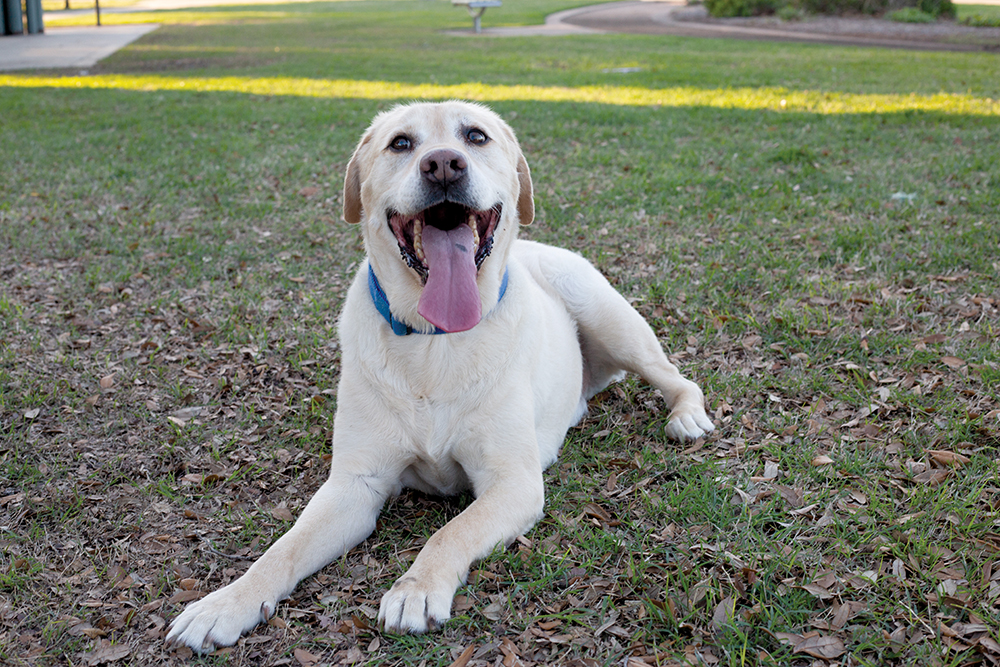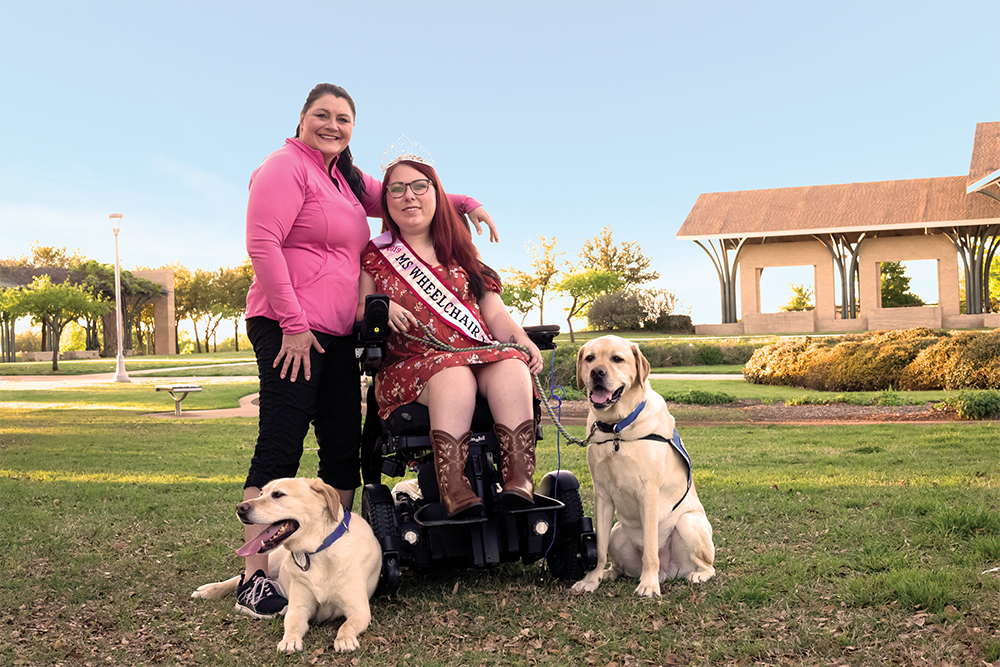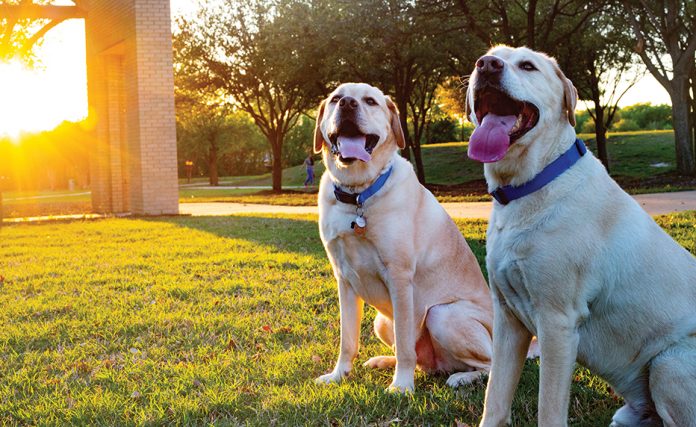Most members of the Rotary Club of Frisco boast strong ties to the community, are highly-skilled in their respective industries and have a desire to serve others. However, only one walks on four legs. His name is Pudge, and he is an 11-year-old yellow Labrador Retriever who has spent most of his life working as a certified therapy dog in North Texas.
His owner, Dawn Cruzan, is the president of the Rotary Club that bestowed on Pudge his honorary Rotarian status. She is also the founder of Camp Craig Allen, a Frisco-based nonprofit organization that serves physically disabled children, adults and military veterans. Pudge has, for years, been a fixture at its educational, recreational and therapeutic programming events.
Elsewhere in the community, Pudge provides comfort by visiting the bedsides of patients at area hospitals and other facilities and appearing at events. He previously participated in a “Read to Rover” session at the Frisco Public Library, and, last Halloween, he posed in costume for photos with thousands of children during an event at Frisco’s Fire Safety Town.
“I am very proud that he gives unconditional love and support to anyone who meets him,” Ms. Cruzan says of the dog, whom she has owned since he was a puppy. “He became very proficient in baseball catching,” so she named him after former Texas Rangers catcher Ivan “Pudge” Rodriguez.
Prior to founding Camp Craig Allen, Ms. Cruzan worked as a certified rehabilitation specialist with those who have catastrophic diseases and injuries that impact their mobility. She recalls observing qualities in Pudge early on that led her to believe he was suited to be a certified therapy dog. “I knew his disposition was very loving and kind.”
 Unlike service dogs (which are owned by those with disabilities, are trained to tackle specific tasks and are afforded access rights to public places, including restaurants and airplanes), certified therapy dogs generally provide comfort, psychological and, in some instances, physical support to people at hospitals, nursing homes and rehabilitation centers, as well as in schools, libraries and other facilities. Their owners are certified as handlers. However, the canines are not allowed the same public access as service dogs.
Unlike service dogs (which are owned by those with disabilities, are trained to tackle specific tasks and are afforded access rights to public places, including restaurants and airplanes), certified therapy dogs generally provide comfort, psychological and, in some instances, physical support to people at hospitals, nursing homes and rehabilitation centers, as well as in schools, libraries and other facilities. Their owners are certified as handlers. However, the canines are not allowed the same public access as service dogs.
Ms. Cruzan started Pudge in a certification training program, which he completed when he was around two years old. He is specially-trained to lean his 75-pound body into manual wheelchairs and act as a stabilizer while adult patients with spinal-cord injuries transfer in and out of their devices. Also, they can grab hold of the handle on the official therapy vest the dog wears and he will help them roll forward.
Pudge, who has worked locally at Baylor Scott & White hospitals and veterans administration facilities, also assists those in power wheelchairs. That “is a big deal,” Ms. Cruzan says, since a lot of dogs are very scared of their noisy motors. Over the years, Pudge has “gotten his tail run over, his foot run over, but he is not scared. If somebody is going to make a turn, he knows they are going to turn before they turn. He is very intuitive.”
Pudge also helps in other ways. His presence previously has been requested by physicians to comfort spinal cord injury patients as they learned they would never walk again. Also, he once befriended a young cancer patient and remained at her side during her final days. At such difficult moments, “That patient just cries on him and Pudge gives them support,” Ms. Cruzan explains. “It is a very calming, gentle presence and environment that you feel.”
In 2014, Ms. Cruzan experienced Pudge’s dedication and loyalty firsthand after enduring a life-threatening medical episode that rendered her unconscious at her home. “They do not know how long I was out, but emergency responders had to remove Pudge off the bed when they found me.” Comatose, Ms. Cruzan was hospitalized for weeks and endured a long recovery process, during which she had to learn how to walk again. Through it all, the dog “was very good. There were times that he needed to help me physically.”
Ms. Cruzan believes Pudge was made to be a therapy dog. “He was made to take the tears of patients on some of their worst days. He is just a great source of comfort. His spirit is just amazing.”
That spirit is usually on display when Pudge attends Camp Craig Allen events. The organization sponsors power wheelchair hockey and adaptive waterskiing programs and runs multi-day adventure camps for physically disabled children and adults at locations around North Texas. During water-skiing activities, “He runs the shoreline the whole way, back and forth, and he will swim out to the skiers,” Ms. Cruzan says. “He goes to all of our camp programs and he will run beside the golf cart or he will go on rolling wheelchair expeditions out in the woods. He knows every path and every way to go.” In his work at Camp Craig Allen, Pudge “has been a champion of what a dog can provide, as far as being an advocate for those with disabilities to get a service dog.”
 He certainly made an impression on Lauren Taylor, a University of North Texas graduate student who, in March, was crowned Ms. Wheelchair Texas 2019. Born with congenital muscular dystrophy, she has known Ms. Cruzan and Pudge since she was a youngster and has previously participated in Camp Craig Allen programming. “He is the sweetest dog you will ever meet. He will come up to you and lean in with all of his weight, just for you to love on him,” Ms. Taylor says. “It does not matter who you are, if you are in a wheelchair or not … he will just sit right next to you and lean up against you. It is just an immediate calming sensation when he is around.” More than two years ago, she became the owner of a service dog named Buchanan, a five-year-old Golden Retriever-Lab mix with whom Pudge has since become buddies. “They wrestle and tumble and play tug-of-war. It is so comical to watch them together.”
He certainly made an impression on Lauren Taylor, a University of North Texas graduate student who, in March, was crowned Ms. Wheelchair Texas 2019. Born with congenital muscular dystrophy, she has known Ms. Cruzan and Pudge since she was a youngster and has previously participated in Camp Craig Allen programming. “He is the sweetest dog you will ever meet. He will come up to you and lean in with all of his weight, just for you to love on him,” Ms. Taylor says. “It does not matter who you are, if you are in a wheelchair or not … he will just sit right next to you and lean up against you. It is just an immediate calming sensation when he is around.” More than two years ago, she became the owner of a service dog named Buchanan, a five-year-old Golden Retriever-Lab mix with whom Pudge has since become buddies. “They wrestle and tumble and play tug-of-war. It is so comical to watch them together.”
Now semi-retired, Ms. Cruzan says Pudge’s previously action-packed schedule has lightened in recent years. Following her medical episode, the two were forced to curb their professional commitments. “He immediately went from having a full-time career touring hospitals and seeing patients and going to programs weekly to enduring complete downtime for six months. He really did not recover from that,” Ms. Cruzan says.
In 2015, Pudge was diagnosed with a mild form of the canine version of Parkinson’s disease. “Luckily, his balance issues and tremors are at a slow progression,” Ms. Cruzan shares. She closely monitors the dog’s activity levels and overall health as he continues to take part in Camp Craig Allen activities several times annually and visits with patients at area hospitals upon request.
Going forward, she intends to increase his participation in the library’s “Read to Rover” program. The two will also attend speaking engagements to educate others about the seven types of working dog classifications, while demonstrating Pudge’s role as an advocate for specialty-trained canines. “When he puts on his therapy vest and his harness,” Ms. Cruzan says, “He is in work mode.”


